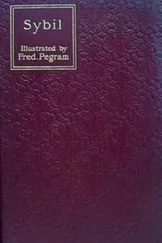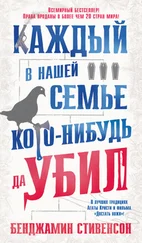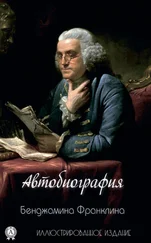‘Goodness.’ His eyes are dark and sunken, but they dance. ‘What, it’s laundry day?’
Simon is wearing the same striped, collared shirt he wore on the bus to San Francisco, along with a pair of running shorts. When class finishes, he runs to the men’s bathroom, takes off the black slippers – the pads of his feet are already swollen – and retches into the toilet.
He wipes his mouth with toilet paper and leans against the wall, panting. He didn’t have time to close the door of the stall, and another dancer, entering the bathroom, stops short. He is easily the most beautiful man Simon has seen in person: sculpted as if from onyx, his skin a rich black. His face is round, with wide cheekbones that curve like wings. A tiny, silver hoop hangs from one earlobe.
‘Hey.’ Sweat drips from the man’s forehead. ‘You okay?’
Simon nods and fumbles past him. After the long flight of stairs, he wanders dazedly down Market Street. It’s sixty-five degrees and windy. On an impulse, he takes his shirt off and reaches his arms above his head. When he feels the breeze on his chest, he’s filled with unexpected euphoria.
It is beautiful masochism, what he just did, more difficult even than the half marathon he won at fifteen: hills, thunder of feet and Simon in the midst of it, gasping down the Hudson River waterfront. He fingers the black slippers, which he shoved in his back pocket. They seem to taunt him. He must become like the other male dancers: expert, majestic, invincibly strong.
In June, the Castro blooms. Prop 6 pamphlets drift through the street like leaves; flowers keel over the sides of boxes with such bounty they’re almost a nuisance. On June 25th, Simon goes to the Freedom Parade with the dancers from Purp. He didn’t know that so many gay people existed in the country, let alone in one city, but there are two hundred and forty thousand of them, watching the kickoff by Dykes on Bikes and cheering as the first rainbow flag is hoisted into the air. Harvey Milk’s upper body emerges from the sunroof of a moving Volvo.
‘Jimmy Carter!’ Milk bellows, his red bullhorn held high, as the sea of men roars. ‘You talk about human rights! There are fifteen million to twenty million gay people in this nation. When are you going to talk about their rights?’
Simon kisses Lance, then Richie, wrapping his legs around Richie’s thick, muscular waist. For the first time in his life, he’s dating – he calls it that, though usually, it’s just sex. There is the go-go dancer from the I-Beam and the barista at Café Flore, a mild-mannered Taiwanese man who spanks Simon so hard that his ass cheeks blush for hours. He falls hard for a Mexican runaway with whom he spends four blissful days in Dolores Park; on the fourth day, Simon wakes up alone beside Sebastian’s floppy, green-and-pink hat and never sees the boy again. But there are so many others: the recovering addict from Alapaha, Georgia; the forty-something Chronicle reporter who is always on speed; the Australian flight attendant in possession of the largest cock Simon’s seen.
On weekdays, Klara wakes before seven and dresses in one of two dull, beige skirt suits from Goodwill. She temps first at an insurance company, then at a dentist’s office, and returns so moody that Simon avoids her until she’s had her first drink. She hates the dentist, she says, but that doesn’t explain the exasperation with which she looks at Simon when he primps in the mirror or returns from a shift at Purp – drowsy, ecstatic, purple paint running down his legs in rivulets. He wonders if it’s the voice messages. They arrive daily: emotional missives from Gertie, lawyerly arguments from Daniel, and increasingly desperate appeals from Varya, who moved home after her final exams.
‘If you don’t come back, Simon, I’ll have to put off graduate school,’ Varya says, her voice wavering. ‘ Someone needs to stay with Ma. And I don’t understand why it always has to be me.’
Sometimes, he comes upon Klara with the cord wrapped around her wrist, pleading for one of them to understand.
‘They’re your family,’ she tells Simon afterward. ‘You have to talk to them eventually.’
Not now , Simon thinks. Not yet . If he speaks to them, their voices will reach into the warm, blissful ocean in which he’s been floating and yank him – gasping, dripping wet – onto dry land.
One Monday afternoon in July, he returns from Academy to find Klara sitting on her mattress, playing with silk scarves. Taped to the window frame behind her is a picture of Gertie’s mother, a curious woman whose diminutive size and fierce gaze has always made Simon uncomfortable. She reminds him of witches from fairy tales, not because there is anything sinister about her but because she seems to be neither child nor adult, woman or man: she’s something between.
‘What are you doing here?’ he asks. ‘Shouldn’t you be at work?’
‘I’m quitting.’
‘You’re quitting,’ says Simon, slowly. ‘Why?’
‘Because I hate it.’ Klara packs one of the scarves down into her left fist. When she pulls it out the other end, it’s turned from black to yellow. ‘Obviously.’
‘Well, you need to get another job. I can’t make rent on my own.’
‘I’m aware of that. And I will. Why do you think I’m practicing?’ She waves a scarf at Simon.
‘Don’t be ridiculous.’
‘Screw you.’ She grabs both of her scarves and stuffs them in the black box. ‘You think you’re the only one who’s entitled to do what you want? You’re fucking the whole city. You’re stripping and dancing ballet , and I haven’t said a thing. If anyone has the right to discourage me, Simon, it isn’t you.’
‘I’m making money, aren’t I? I’m holding up my end of the bargain.’
‘You Castro gays.’ Klara sticks a finger at him. ‘You don’t think of anyone but yourselves.’
‘What?’ he says, stung; Klara never speaks to him this way.
‘Think about it, Simon – how sexist the Castro is! I mean, where are the women? Where are the lesbians?’
‘What’s it to you? You’re a lesbian now?’
‘No,’ says Klara, and when she shakes her head, she looks almost sad. ‘I’m not a lesbian. But I’m not a gay guy, either. I’m not even a straight one. So where do I fit in here?’
When their eyes meet, Simon looks away. ‘How am I supposed to know?’
‘How am I? At least, if I start my own show, I can say that I tried.’
‘Your own show ?’
‘Yes,’ Klara snaps. ‘My own show. I don’t expect you to understand, Simon. I don’t expect you to worry about anything but yourself.’
‘You’re the one who convinced me to come here! Did you really think they’d let us go without a fight? You thought they’d just let us stay?’
Klara’s jaw is tight. ‘I wasn’t thinking about those things.’
‘Then what the hell were you thinking about?’
Klara’s cheeks have turned a sunburnt coral that only Daniel usually provokes, but she keeps quiet, as if indulging Simon. It’s not like her to censor herself. It certainly isn’t like her to avoid eye contact, which she does now, latching her black box with more focus than the task requires. Simon thinks of their conversation on the rooftop in May. We could go to San Francisco , she said, as if the idea only just occurred to her, as if she didn’t know exactly what she was doing.
‘That’s the problem,’ Simon says. ‘You never think. You know exactly how to get into something and you know how to bring me with you, but you never think about what the consequences will be – or maybe you think about them and you just don’t care, not until it’s too late. And now you’re blaming me? If you feel so bad, why don’t you go back?’
Читать дальше
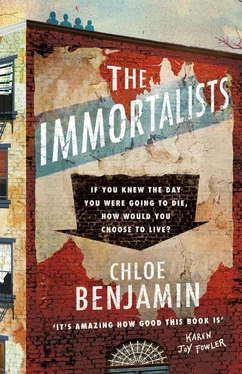

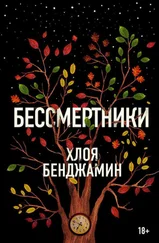

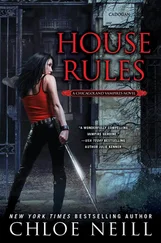
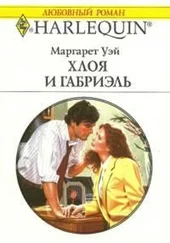
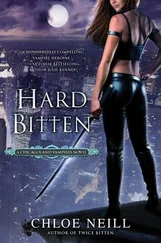

![Мелани Бенджамин - Госпожа отеля «Ритц» [litres]](/books/384861/melani-bendzhamin-gospozha-otelya-ritc-litres-thumb.webp)
